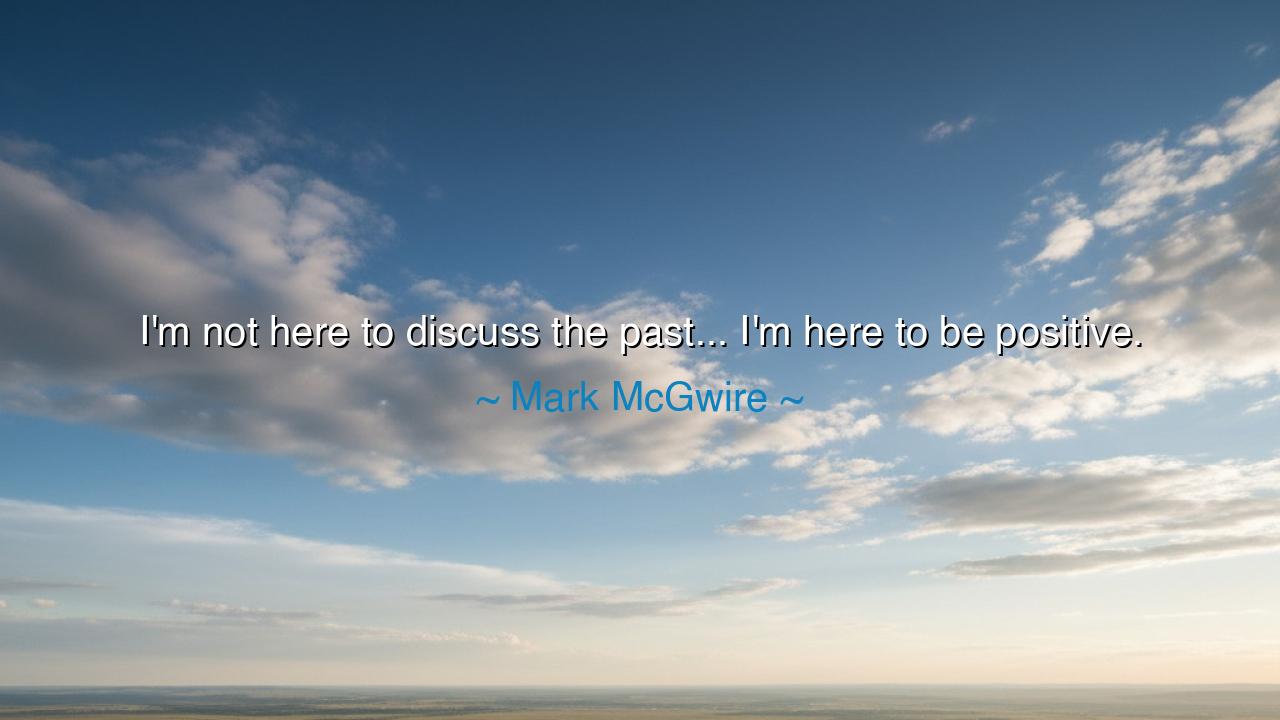
I'm not here to discuss the past... I'm here to be positive.






When Mark McGwire declared, “I’m not here to discuss the past… I’m here to be positive,” he gave voice to a truth that echoes through the corridors of time: the past, whether glorious or shameful, cannot be altered, but the present and the future remain clay in our hands. His words remind us that to dwell endlessly on mistakes is to be bound in chains of regret, but to turn toward positivity is to step into freedom. It is not denial of history, but a refusal to let history dictate the light of today.
The ancients knew this wisdom well. The Stoics taught that yesterday is gone, tomorrow is not yet here, and only the present moment is in our control. Marcus Aurelius, emperor and philosopher, declared, “Do not dwell in the past nor dream of the future; concentrate the mind on the present.” McGwire’s statement carries this same spirit: not to erase what has been, but to focus on what can be made now through positive thought and action.
History provides luminous examples. Consider Abraham Lincoln, who endured repeated political defeats and the anguish of personal loss. Had he allowed his past failures to define him, he would never have risen to lead a divided nation. Instead, he pressed forward, guided by hope and principle, focusing on what he could do in the present. His greatness lay not in perfect beginnings, but in his refusal to be crushed by the weight of what had already been. Like McGwire, he turned his eyes from the shadows of yesterday to the possibilities of today.
McGwire’s words also carry within them the power of resilience. For every person carries burdens — regrets of choices made, shame of opportunities lost, or pain inflicted by others. To continually rehearse these sorrows is to wound oneself anew. But to say, “I am here to be positive,” is to choose life, to redirect energy from regret into growth. It is to transform the weight of the past into fuel for a brighter journey ahead.
At the heart of this teaching lies renewal. The past may be written, but the present is unwritten, and the future waits like a blank canvas. To be positive is to pick up the brush and paint not with the colors of bitterness, but with the hues of gratitude, forgiveness, and hope. In this way, one does not deny the existence of the past, but transcends it, declaring: “I am more than my history; I am the author of what comes next.”
The lesson is clear: every soul must learn to walk forward. Do not let the mistakes of yesterday silence your voice today. Do not allow the shadows of your past to blind you to the light of new beginnings. Instead, cultivate a mind that seeks positivity in every moment, and let that light guide you toward healing and accomplishment.
In practice, this means reflecting on your past with honesty but refusing to dwell in it with despair. Acknowledge what has been, learn its lessons, and then rise to build something better. Speak words that uplift rather than condemn, surround yourself with companions who encourage your journey, and take steps each day that move you closer to peace. Positivity is not passive—it is an act of courage.
Therefore, let us remember McGwire’s wisdom: the past is unchangeable, but the present is alive with possibility. Stand in the moment, choose positivity, and shape your future with courage. For the greatest victory is not to erase what was, but to transform what is into something greater than all that came before.






TMVi Thi Mien
I find this focus on positivity appealing, but it also makes me wonder about its impact on accountability. Is it enough to concentrate on the present, or must past actions be addressed to ensure credibility and trustworthiness? I’d like perspectives on how public figures and everyday individuals can strike a balance between looking forward and responsibly acknowledging what came before.
QNquynh nhu
This perspective raises interesting questions about mindset and narrative. Can deliberately ignoring past controversies or failures actually enhance mental well-being, or does it create tension between reality and perception? I’m curious how people can genuinely stay positive while reconciling past experiences, and whether acknowledging lessons learned might strengthen rather than diminish optimism.
QMQuan Manh
I feel inspired by the focus on moving forward, but I also question whether completely avoiding discussion of the past might limit personal reflection and emotional healing. Are there situations where revisiting past experiences is necessary to build resilience or restore trust? I’d like to explore strategies for maintaining optimism while responsibly engaging with prior mistakes.
DXchai lo den xu
Reading this makes me reflect on public perception and reputation management. Is it possible that emphasizing positivity over past events is a strategic choice rather than purely personal? How do audiences differentiate between genuine forward-looking optimism and attempts to deflect accountability? I’d like to discuss how transparency and positivity can coexist, especially when someone has a complicated history.
HHi
This statement evokes curiosity about the role of the past in personal development. Can focusing only on positive aspects genuinely lead to progress, or is acknowledgment of past errors necessary for authentic growth? I’m interested in exploring how individuals and public figures navigate scrutiny and criticism while trying to maintain a constructive and optimistic outlook.